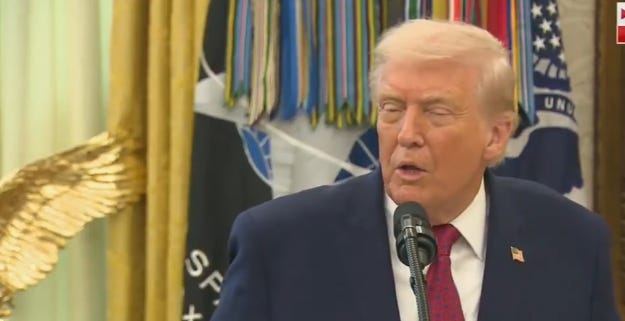When Democrats pushed the $1.2 trillion Bipartisan Infrastructure Law (BIL) through Congress in 2021—with hardly any bipartisan support—Donald Trump warned Republicans not to vote for it. "Patriots will never forget!" said Trump, who described the bill as "a loser for the USA, a terrible deal, and makes the Republicans look weak, foolish, and dumb."
Patriots may never forget, but it appears that Trump—who is now taking credit for projects funded by the bill—has.
Under the Biden administration, many project sites sponsored by the BIL displayed signs crediting former President Joe Biden and his infrastructure law for funding the job. In recent months, these signs have been changed to predominantly credit Trump for making these projects happen, reports The New York Times.
"The signs bearing Mr. Trump's name now adorn bridge projects in Connecticut and Maryland; rail-yard improvement projects in Seattle, Boston and Philadelphia; and the replacement of a tunnel on Amtrak's route between Baltimore and Washington," writes the Times. An Amtrak spokesperson told the paper that the sign change was "a voluntary Amtrak initiative." The Transportation Department credited Amtrak with "recognizing the Trump administration's 'swift action' in clearing a backlog of roughly 3,200 grants that the Biden administration had allocated but not awarded."
A politician—especially one named Trump—taking credit for someone else's work is nothing new. But given the bill's failures, it's a questionable choice, even by the president's standards.
While the BIL has boosted infrastructure projects in the United States, some of the projects it funded are "not needed nonsense," Baruch Feigenbaum, senior managing director for transportation policy at Reason Foundation, the nonprofit that publishes this magazine, tells Reason.
But what sets the BIL apart is not just the unprecedented funding levels for hard infrastructure—including $673.8 billion for roads, bridges, transit, ports, and rail—but also the bill's unusual funding mechanisms for some of these projects. While a lot of the bill's infrastructure projects were formula-funded—which allocates money to states or congressional districts based on factors like population or square mileage and is what's used most often in federal transportation bills—the BIL also included the most grant funding of any other infrastructure bill, says Feigenbaum.
Getting this money out of the door "has been slow. Communications and explaining why the [Transportation Department] is taking so long has also been very tortured, and it's leaving a lot of folks frustrated. So the grants have been a major problem," says Feigenbaum. In addition to bureaucracy, award recipients cited inflation, federal environmental reviews, and the Build America, Buy America Act as the largest project challenges, according to a July survey from the Government Accountability Office.
Still, hard infrastructure projects under the BIL should consider themselves lucky to have had any success; despite being given over $42 billion, the bill's rural broadband program has yet to connect a home to the internet.
The infrastructure bill also funded things that are very clearly not infrastructure, including $62 billion to the Energy Department "to deliver a more equitable clean energy future for the American people." This funding supported the opening of dozens of new offices and grant programs within the agency to bolster fossil fuels, renewable energy, and energy efficiency technologies. Unsurprisingly, rapidly increasing the agency's budget has led to several examples of wasteful and frivolous spending. The Trump administration has rescinded some of this funding, while also passing its own wasteful spending that will likely hurt energy reliability and saddle future generations with debt.
Given that the Bipartisan Infrastructure Law included a heap of corporate welfare and unnecessary projects, it's no wonder that Trump wants to take credit for it. Hopefully for taxpayers, his plagiarism ends with commandeering road signs, and not with another mega-spending bill.
The post Trump Once Called Biden's $1.2 Trillion Infrastructure Bill 'Terrible.' Now He's Pretending He Signed It. appeared first on Reason.com.













 Bengali (Bangladesh) ·
Bengali (Bangladesh) ·  English (United States) ·
English (United States) ·